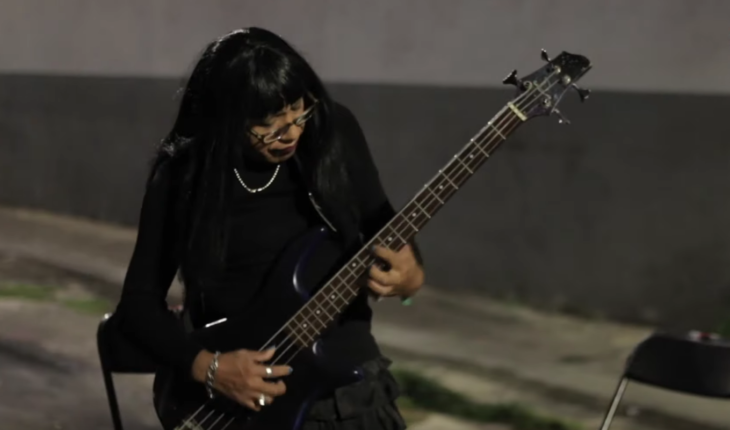Julia Hernandez is 51 years old and an electric bass.
He bought it four or five years ago, in another life far away.
At the time, Julia wasn’t called Julia. She was married to a woman and had not begun her gender transition.
But now Julia is what she always wanted to be: a transgender woman who plays bass and who would like to have a chance in a band.
“I want to be the first bassist transgender woman in a musical group. And I know that if I can be, I’m going to open the door to a lot of my talented fellows,” he says. “They are wasted talents. Because unfortunately these little people, not having this opportunity, because he has no choice but to be typecast again, or in sex work or aesthetics. And they end up suppressing their true vocation,” he says.
Read more: A hearse in the middle of the pride party so as not to forget hate crimes
Currently, Julia works in the Government of Mexico City, on a weekend and holiday shift; sells by catalog beauty products and footwear and also offers its sexual services.
If you ask her, what she would really like would be to live off music.
Like when I was 17 and playing weekends in a set. Or as when he was studying at the National Conservatory, before his father, an authoritarian type and old-fashioned veneer, took him out of his studies when he already had plans to go to London on a scholarship to learn with the Royal Philharmonic.
Julia is a woman who conveys joy and honesty. She is excited about her bass and gets excited to talk about music and her projects.
It wasn’t always like that.
“If you saw me a year ago, I’d just cry,” she says.
Find out: Michelangelo, the young LGBT activist who dreamed of being a model and who was murdered
Julia’s story is that of a woman who would like to make a living playing an instrument. That of a woman who took the step of becoming a woman just two years ago, when she was already in the middle century. That of a woman who has suffered. You look at her and she sees someone who is brave, who fought to be who she is, who was not always understood, but who faced prejudice, discrimination and transphobia.
All that says Julia, almost without speaking, before the interview began.
It is located in the vicinity of the Metro Revolución, in Mexico City. This is a point where sex workers like her offer their services. Every Friday, the Telar and Casa de las Muñecas Tiresias collectives offer workshops on painting, expression and music. That’s his thing: music. This workshop is the start of what a band should be. Imagine: the first transgender band and sex server in Mexico City. Although it’s still early for that. At the moment, they’re just rehearsing.
The place is symbolic. Here, a few meters away, Paola Buenrostro was murdered on September 16, 2016. This is the first case of transfeminicide recognized by Mexican justice. His is one of the names that appear on a blanket with faces that each decorates to remember those who have already left. It is a work of the artist Fernando León, who was inspired by the Tzompantli, an Aztec representation of faces of the dead on the esplanade.
You may be interested: Singer Joy accuses discrimination when processing her baby’s passport
That case impacted the community. She made visible how exposed transgender women and sex workers are exposed to violence.
Murder is the last rung of the race of discrimination. All the trans women who gather here have been forced to travel through it on more than one occasion.
“Trans people are a group of the most reported incidents,” says Enrique Ventura Marcial, director of Visibility of the National Commission for the Prevention of Discrimination.
Meeting these afternoons, learning together, chatting, sharing a coffee, is a way to unite against that sometimes hostile world.
“It’s a thing that helps a lot. As much as therapy, as you want to see it, because it’s an emotional relief. Whether you like it or not, we live every day with inequality, with transphobia, so what can we do? Finding escapes, finding activities, making us versatile in mind,” says Ariel, 21. She is also a sex worker and participates in the workshop with Julia. He doesn’t want to give his real name. For now, it focuses on percussion. At her side, Julia sets the pace of a Shakira song, “brute, blind, deaf-mute”.
Read more: To the band beat, mixed women break with the stereotype that music is a man’s thing
“I have an electric bass because I’m a bass player. I have been a girl since I was a child, because I am a girl, despite my body, I am a girl, I am a woman, from a very young girl, I really liked music,” says Julia. She’s happy, though what she’s going to tell us is not at all cheerful.
“In my family they are very traditionalists, very conservative, and they wanted me to study a career, what they call normal, serious: medicine, engineering, architecture, law. But that didn’t get my attention. For me, my thing was music,” he explains.
Julia talks about her teenage years with a cheeky smile. Of the different schools he went through. His passion for music. From a band they formed that allowed him to earn his 700 pesos every weekend. “It was a buck,” he says, laughing at his family’s belief that that was “for the starving.”
Her father’s attempt to study music kept Julia away from the instruments for a long period. Until the changes came into his life.
First, buying a bass.
Then the gender change.
All very often. A very painful process that will lead Julia to be the woman she is today.
“Actually, I always knew something didn’t match me. I hid it for society, because of my work, I didn’t dare. I longed, I looked at my long hair, dressed as a woman,” she says.
“There came a time when the true person I am, that I chained for many years, for many years and decades, I buried her, imprisoned her and denied her. That person, he broke free. And when he broke free, he did it in a way that almost destroyed me,” he explains.
Find out: How a transgender woman survived conversion therapies
We’re at the time of Julia’s crisis. The depressed Julia. Julia who damages her body. The Julia who has to explain to his wife and daughter, of Mormon religion, who is called Julia. The Julia who drinks too much.
“I was a few seconds away from killing myself, because I fell into a very strong depression,” he explains.
He currently has a “purely commercial” relationship with his former partner.
Your daughter hasn’t spoken to you again.
“I have had to strengthen myself. I’ve learned to be strong, very strong. I’ve had to learn to swim against the current and fight adversity,” he says.
Since Julia began her transition process, she has seen many cases of discrimination.
The first ones, at work.
“I was denied access to the women’s room. If I had known the regulations, I would have clawed everyone there,” he says.
You may be interested: Money to make inclusive transportation has been spent on other things, nGO denounces
Statistics on discrimination at work are discouraging. Six out of ten trans people did not get a job because of their sexual identity, according to the 2018 National Diagnosis on LGTBI Discrimination.
“It is difficult for us to find a job that can pay us well or that gives us benefits for the people we want to work and study, it is quite difficult. That’s where we come across a factor of employment discrimination. Why? Well, just because it’s trans,” says Ariel, the classmate who participates in the workshop.
This extends to music.
“They believe that if they accept one of us among their ranks, they will burn. It’s a misconception they have. Why? Because there are some transgender women who are talented in music,” she says.
Julia explains that she went to two interviews for musical projects. In no one she was chosen. “In one they said to me, ‘Oh, what do you think? We’re not going to do the project thing, we’re going to cancel it for the time being…’. And it wasn’t true. Then I went to a second one and they ended up saying to me, ‘You don’t know what, it’s that by a majority of votes here of the elements, we better choose a guy.’ And why did they choose a guy? ‘It’s that he lives closer.’ Don’t lie to me, if I know that just like I live until the fifth inferno,” he says.
Julia insists on her dream: “To be the first trans bassist.”
“Unfortunately we are in a country not yet prepared for this, still very sexist, very transphobic,” he laments.
What we do in Animal Político requires professional journalists, teamwork, dialogue with readers and something very important: independence. You can help us keep going. Be part of the team.
Subscribe to Animal Politician, receive benefits and support free journalism.#YoSoyAnimal
translated from Spanish: Transgender bassist fighting discrimination
September 1, 2019 |





